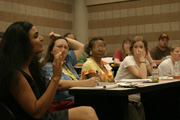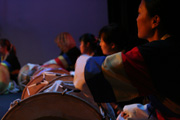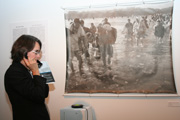- Campuses :
- Twin Cities
- Crookston
- Duluth
- Morris
- Rochester
- Other Locations

asias@umn.edu
612-625-6103
Professional Development for Teachers
2014 Summer Institutes for Educators
The Consortium for the Study of the Asias, in collaboration with partnering centers such as the Institute for Global Studies and the Center for International Business Education and Rsearch, organizes professional development opportunities that encourage educators to explore current issues in international studies through conferences, seminars, short courses and faculty presentations.
Workshops and institutes challenge teachers to combine experience in applying critical thinking and problem-solving skills to international issues with the knowledge and materials needed to engage their students. To prepare our students for global citizenship in the 21st Century, theConsortium for the Study of the Asias is working to strengthen international studies in K-16 education.
Capturing Stories of Diasporas through Digital Storytelling
June 16-19, 2014, 9:00am-4:00 pm, Room 614 Social Sciences, West Bank U of MN
Registration deadline: June 2, 2014
Digital stories are first-person narratives and multimedia presentations that combine digitized still images, video clips, voiceover narration and music. Creators of digital stories make sense of the world through inquiry, self-reflection and perspective-taking. In this workshop, participants will learn about global migration patterns of people in Europe, Asia, Africa, North America and South America as well as develop technical skills necessary to create a digital story. The purpose of this workshop is to give educators skills necessary for them to help students in their classroom tell stories of migration and to help students achieve the following global competencies as defined by the US Department of Education:
- Students investigate the world beyond their immediate environment by identifying an issue, generating questions, and explaining significance.
- Students recognize their own and others’ perspectives by explaining the impact of cultural interaction.
- Students communicate their ideas effectively with diverse audiences by selecting and using appropriate technology and media to communicate with diverse audiences.
- Students translate their ideas into appropriate actions to improve conditions by acting personally or collaboratively in creative and ethical ways to contribute to improvement and assess impact of actions taken.
Educators should come to the institute with a 300-500 word narrative about their own personal or family history immigrant experience OR a narrative about their experience working with people in immigrant or refugee communities.
Instructors: Immigration History Research Center staff, more TBA
Cost: $100 includes all parking, materials, fieldtrips and lunches
CEUs: 30
Optional on campus housing available for $300
Global Dimensions of the Food Industry
Global Business Summer Institute for Teachers
Dates: June 23-26, 2014, 9:00 am-4:00 pm, Carlson School of Management
Registration deadline: June 9, 2014
In this workshop participants will learn about international trends in agriculture, food policy, food distribution and consumption, and trade. Participants will examine global food supply chains and operations, understand how Minnesota food companies market to consumers and customers in other parts of the world, and explore food safety issues in a global context.
We will explore these topics through class sessions, case studies, and discussions with local companies. The program includes a site visit to International Dairy Queen to discuss how it customizes, markets and prices its products internationally. Small group discussions will help participants integrate material into their classrooms.
The University of Minnesota CIBER is one of 33 centers nationwide designed to increase the nation's capacity for international understanding and economic enterprise. It serves as a regional resource for businesses, educators, researchers, and students. CIBER’s initiatives focus on environmental sustainability, emerging markets, and less commonly taught languages.Instructors:TBA
Sponsors Center for International Business Education and Research(CIBER), Institute for Global Studies UMN
Cost: $100 includes all, materials, fieldtrips and lunches
CEUs: 30
Optional on campus housing available for $300
Food! in the Global Classroom
Dates: July 14-17, 2014, 9:00am-4:00 pm, R-380 Learning and Environmental Sciences, St Paul Campus
Registration deadline: June 30, 2014
Food is essential to our health and wellbeing. One of the pressing questions of our time is how do we feed the world and sustain our planet? How do we integrate food into all disciplines in our schools and educate our students to be future problem solvers of these global concerns? From Europe to the Americas, from Africa to Asia, these topics are becoming increasingly important. In this institute, educators will examine issues of food sustainability, food justice, food as a part of the international human rights declaration, food affordability, international food protection policy, as well as address how to use food to teach about cultures all over the world. We will examine these global issues of food in local context by making site visits to both urban and rural farms before enjoying an international cooking night in a kitchen housed in a global market. We will also be visiting the Flavor Education and Research Center at the University of Minnesota. The purpose of this institute is to give educators knowledge and resources through interdisciplinary studies about food issues to bring back to their classrooms so their students can become globally competent as defined by the U.S. Department of Education:
- Students investigate the world beyond their immediate environment by identifying an issue, generating questions, and explaining significance.
- Students recognize their own and others’ perspectives by articulating how differential access to knowledge, technology and resources affects quality of life and perspectives.
- Students communicate their ideas effectively with diverse audiences by recognizing and expressing how diverse audiences perceive meaning and how that affects communication.
- Students translate their ideas into appropriate actions to improve conditions by reflecting on capacity to advocate for and contribute to improvement
Instructors:
Barrett Colombo, Institute onthe Environment, U of MN
Kris Igo, Food Science and Nutrition, U of MN
Uli Koester, Midwest Food Connection
Neal Frederickson, National Center for Food Protection and Defense, U of MN
Cost: $100 includes all parking, materials, fieldtrips and lunches
CEUs: 30
Mapping Identities: Integrating the Arts and Language Acquisition
Professional Development for Language Educators
July 21-24, 2014, 9:00am-4:00 pm, Room 614 Social Sciences, West Bank U of MN
Registration deadline: July 7, 2014
The arts touch upon every aspect of human life. The integration of the arts into the curriculum provides students with a rich entryway into a target language and culture. Moreover, it is also a way of reflecting profoundly about one’s own culture or cultures. Students can be exposed to the vast array of meaningful artistic production in any given culture via the literary, performing, digital and visual arts. Not only do students gain a heightened awareness of the culture or cultures in question via the arts, but also they are able to respond to the artistic production in meaningful ways via classroom assignments, activities, exercises and projects thus providing more reality-based topics of discussion.
Beyond engaging the arts as a powerful bridge to language acquisition and cultural comprehension, students themselves are invited to become artistic creators in the target language, or even in their own language as a means of deep exploration. The language/literature/culture classroom therefore becomes a community of artistic creators engaged in both responding to existing artistic production from the cultures in question and relating to the target or native language and cultures via student production.
This Summer Institute will lead participants through this “experience” with a series of activities combining the performing, visual, and literary arts. Particular attention will be paid to the performing arts as a means of embodying the target and/or native cultures in question. Participants will be given materials and models that can be applied to a number of fields within the K-12 curriculum and college-level for students of all levels and ages.
We will work with the Performance Cycle, developed by Eileen Landay and Kurt Wootton and will engage in exercises, activities, and mini-projects that take us through the Performance Cycle. We will be working with the themes of identity, home, belonging and displacement via texts and the arts. Please note that Performing Text can come about in a myriad of ways. The idea is to have a final outcome and to honor the work everyone produces. No experience in the arts required.
Workshop will be conducted in English
Instructor: Dr Patricia Sobral, PhD Department of Portuguese and Brazilian Studies, Brown University
Cost: $100 includes all parking, materials, fieldtrips and lunches
Optional on campus housing available for $300
CEUs: 30
Memory, Justice and Reconciliation: Coming to Terms with Past Atrocities
July 28-July 31, 2014, 9:00am-4:00 pm, Room 710 Social Sciences, West Bank U of MN
Registration deadline: July 14, 2014
This institute is a partnership between the Human Rights Program and the Center for Genocide and Holocaust Studies at the University of Minnesota.
Instructors:
Dr. Alejandro Baer, Center for Genocide and Holocaust Studies, U of MN
Barb Frey, Human Rights Program U of MN.
Cost: $100 includes all parking, materials, fieldtrips and lunches
Optional on campus housing available for $300
CEUs: 30
CANCELLATION DEADLINE: If you need to cancel your registration, a refund minus $20 will be issued to you if you cancel in writing to Deborah Jane outreach@umn.edu by June 2, 2014. If you cancel after this date, you will not be eligible for a refund.
 Professor Richa Nagar makes a comment.
Professor Richa Nagar makes a comment.
 Shinparam performing at opening night of Still Present Pasts.
Shinparam performing at opening night of Still Present Pasts.
 Visitor listens to oral history while viewing an archival photo.
Visitor listens to oral history while viewing an archival photo.


